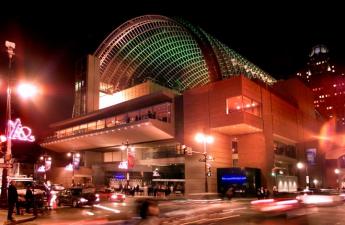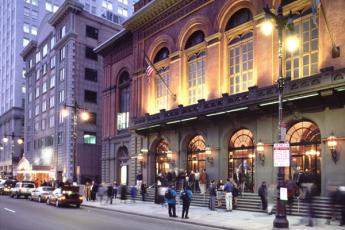Related Topics
Musical Philadelphia
Quakers never cared much for music, but the city has nonetheless musically flourished into international fame. At the same time, quarrels and internal battles have also been world class.
Right Angle Club 2012
This ends the ninetieth year for the club operating under the name of the Right Angle Club of Philadelphia. Before that, and for an unknown period, it was known as the Philadelphia Chapter of the Exchange Club.
Running the Opera

|
| The Kimmel Center |
MICHAEL Bolton, Vice President of the Opera Company of Philadelphia, recently addressed the Franklin Inn Club, giving one of the more informative descriptions we have had about the inner workings of a philanthropic entertainment. We are very grateful to him for being so frank and open about an important perplexing issue.
The Academy of Music was originally designed as an opera house but served for many years as the home of the Philadelphia Orchestra as well. We formerly had two Opera companies, but the audience couldn't support two before they merged. Things are now definitely looking better for opera in Philadelphia; the recent presentation of La Boheme , for example, was one of the high points of American opera in recent memory. However, that achievement has been made with struggles and a certain amount of patchwork. For example, the Academy of Music is owned by the Philadelphia Orchestra, which now has its home in the Kimmel Center, and rents the Academy building to the Opera. It's hard to know who makes out better in this circular arrangement, but there is little doubt the Opera Company is pinched by the rental fee of $45,000 per performance, which probably partly goes to subsidize some of the financial troubles of the Orchestra that have recently been in the papers. It ends up costing a million dollars to put on a performance at the Kimmel Center, nearly two million to put one on in the Academy.
It's true that our opera costs (and ticket prices) are less than in many other cities, most notably the Metropolitan Opera in New York. But it's more important to know that only half the budget is spent on performers. When you hear of the prices paid to performers, particularly soloists, it's easy to imagine this is the main source of financial strain. But the issue is not what people are paid, but rather who is overpaid. At the top of the list has to be the stagehands, whose hourly wages Mr. Bolton declined to specify. But I recently had the opportunity to overhear a conversation on the train between a stagehand and his friends. With great glee, the gentleman described how few hours he worked, how little needed were his services, and how soon he expected to retire. Even making some allowance for boastfulness, this recital was a little hard to take on the day after I had sat in a hundred-dollar seat.

|
| The Academy of Music |
Philadelphia wants to put on more and better operas. There are so many applicants for positions that the junior nonfamous singers are charged $300 by the agents, just to have an audition. Voice teachers command several hundred dollars an hour to coach aspiring performers. There is a great oversupply of performers in the local market; the problem is inadequate demand, resulting in part from high prices. No doubt this situation will correct itself, partly, when the economy recovers. Unfortunately, however, some of us old-timers can remember the Japanese recession which is in its seventeenth year, and our own Great Depression of the 1930s, which lasted fifteen.
My own suggestion is that the Italian and Central European immigrants of the early Twentieth century are disappearing, and their children have become Americanized. What we now need is to make a conscious effort to Americanize classical music, especially opera. American singers no longer adopt European stage names; it's more likely to be the other way. Let's recall that America was founded just eight blocks from the Academy. Beaumarchais, the one who wrote the Barber of Seville, ran a Revolutionary gunpowder smuggling ring in conjunction with Robert Morris. Major Andre and General Burgoyne were authors and producers of theater. If librettists get desperate, there is always Benedict Arnold the estranged hero of the Battle of Saratoga. And George Washington with tears on his cheeks as he gave orders for Major Andre to dance on the end of a rope. There's plenty of material for grand opera in this city. And most of it is even true.
Originally published: Sunday, October 21, 2012; most-recently modified: Wednesday, June 05, 2019